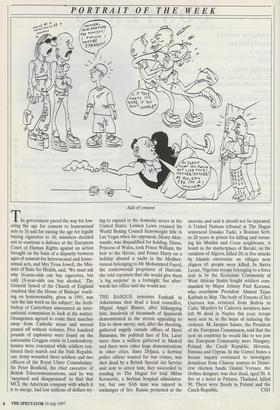PORTRAIT OF THE WEEK
Aids of consent
The government paved the way for low- ering the age for consent to homosexual acts to 16 and for raising the age for legally buying cigarettes to 18; ministers decided not to continue a defence at the European Court of Human Rights against an action brought on the basis of a disparity between ages of consent for heterosexual and homo- sexual acts, and Mrs Tessa Jowell, the Min- ister of State for Health, said, 'We must ask why 16-year-olds can buy cigarettes, but only 18-year-olds can buy alcohol.' The General Synod of the Church of England resolved that the House of Bishops' teach- ing on homosexuality, given in 1991, was `not the last word on the subject'; the Arch- bishop of Canterbury announced an inter- national commission to look at the matter. Orangemen agreed to route their marches away from Catholic areas and several passed off without violence. Five hundred pounds of explosives were found on the nationalist Creggan estate in Londonderry; houses were evacuated while soldiers con- tinued their search and the Irish Republi- can Army wounded three soldiers and two officers of the Royal Ulster Constabulary. Sir Peter Bonfield, the chief executive of British Telecommunications, said he was `surprised and disappointed' to find that MCI, the American company with which it is to merge, had lost millions of dollars try- ing to expand in the domestic sector in the United States. Lennox Lewis retained his World Boxing Council heavyweight title in Las Vegas when his opponent, Henry Akin- wande, was disqualified for holding. Diana, Princess of Wales, took Prince William, the heir to 'the throne, and Prince Harry on a holiday aboard a yacht in the Mediter- ranean belonging to Mr Mohammed Fayed, the controversial proprietor of Harrods; she told reporters that she would give them `a big surprise' in a fortnight, but after- wards her office said she would not.
THE BASQUE terrorists Euzkadi to Askatasuna shot dead a local councillor, Miguel Angel Blanco, after kidnapping him; hundreds of thousands of Spaniards demonstrated in the streets appealing to Eta to show mercy, and, after the shooting, gathered angrily outside offices of Herri Batasuna, the political face of Eta. Later more than a million gathered in Madrid and there were other huge demonstrations in other cities. Simo Drljaca, a Serbian police officer wanted for war crimes, was shot dead by a British Special Air Service unit sent to arrest him; they succeeded in sending to The Hague for trial Milan Kovacevic, a Serbian hospital administra- tor, but one SAS man was injured in exchanges of fire. Russia protested at the exercise and said it should not be repeated. A United Nations tribunal at The Hague sentenced Dusako Tadic, a Bosnian Serb, to 20 years in prison for killing and tortur- ing his Muslim and Croat neighbours. A bomb in the marketplace of Baraki, on the outskirts of Algiers, killed 20; in five attacks by Islamic extremists on villages near Algiers 65 people were killed. In Sierra Leone, Nigerian troops belonging to a force sent in by the Economic Community of West African States fought soldiers com- manded by Major Johnny Paul Koroma, who overthrew President Ahmed Tejan Kabbah in May. The body of Ernesto (Che) Guevara was returned from Bolivia to Cuba. Murders by Camorra members have left 90 dead in Naples this year; troops were sent in, in the hope of reducing the violence. M. Jacques Santer, the President of the European Commission, said that the next six countries he would like to see join the European Community were Hungary, Poland, the Czech Republic, Slovenia, Estonia and Cyprus. In the United States a Senate inquiry continued to investigate donations from Chinese sources to Demo- crat election funds. Gianni Versace, the clothes designer, was shot dead, aged 50. A fire at a hotel in Pattaya, Thailand, killed 90. There were floods in Poland and the


























































 Previous page
Previous page